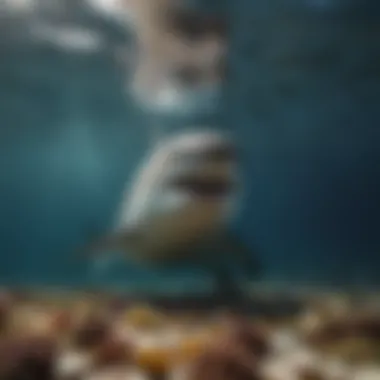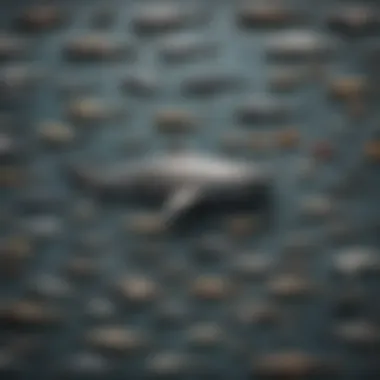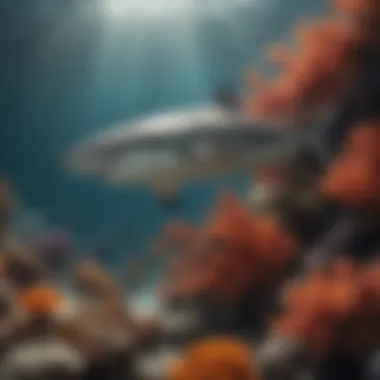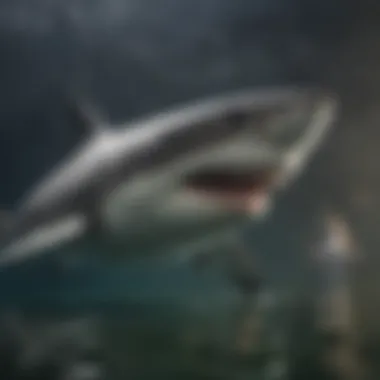The Intricacies of Discovery Channel's Shark Week: An In-Depth Exploration


Intro
Shark Week, initiated by the Discovery Channel, serves as a pivotal platform for educating audiences about one of the ocean's most misunderstood creatures. From its inception, Shark Week has transformed the way the public views these marine animals. This article aims to dissect the layers of Shark Week, considering its historical context, educational impact, and the scientific narratives that emerge during this unique event. Analyzing these aspects allows for a deeper understanding of sharks and the urgency surrounding their conservation.
Animal Overview
Common Name and Scientific Classification
Sharks belong to the subclass Elasmobranchii within the class Chondrichthyes. This class includes species like great white sharks (Carcharodon carcharias), hammerhead sharks (Sphyrna), and tiger sharks (Galeocerdo cuvier). Their evolutionary trajectory spans over 400 million years, making them one of the most ancient groups of animals on the planet.
Physical Characteristics
Sharks exhibit a range of physical traits depending on their species. Generally, they possess a streamlined body that aids in efficient swimming. Their skin, covered by dermal denticles, provides protection and reduces drag in water. Most sharks have five to seven gill slits, which enhance their respiratory efficiency.
Habitat and Distribution
Sharks inhabit varied environments, from the warm, shallow waters of coastal regions to the depths of the open ocean. They are found in all climatic zones, demonstrating remarkable adaptability. Some species prefer the cooler waters of the northern Pacific, while others thrive in tropical reefs. This adaptability plays a significant role in their survival and ecological importance.
Behavior and Social Structure
Communication Methods
Sharks primarily communicate through body language and sensory signals. Their keen sense of electroreception allows them to detect the electromagnetic fields generated by other animals, serving as an essential tool for navigation and hunting.
Social Hierarchies
While some shark species are solitary, others demonstrate social behaviors. For instance, tiger sharks have been observed engaging in cooperative hunting, indicating a level of social interaction that challenges the traditional view of sharks as purely solitary predators.
Mating and Reproductive Behavior
Shark reproduction varies widely among species. Some are oviparous, laying eggs that develop outside the mother's body, while others are viviparous, with live births occurring after an internal gestation period. For example, the great white shark has a gestation period of around 11 months, highlighting the investment these creatures make in their progeny.
Conservation Status
Current Population Trends
Many shark species face significant population declines due to overfishing and habitat loss. Research indicates that some populations have decreased by over 70% in recent decades, raising alarms within conservation communities.
Threats and Challenges
Sharks encounter numerous threats, including bycatch in fishing gear, habitat degradation, and the demand for shark fins in culinary practices. These factors create a perilous situation for various species, contributing to their diminished numbers.
Conservation Efforts and Success Stories
Efforts to conserve shark populations are ongoing. Organizations around the world are working to implement protective legislation, create marine reserves, and promote sustainable fishing practices. Success stories, such as the recovery of certain shark species in protected areas, demonstrate that focused conservation efforts can yield positive results.
Shark Week provides a vital opportunity to educate the public and advocate for the protection of these essential marine creatures.
Prologue to Shark Week
Shark Week stands as a pivotal event on the Discovery Channel, serving multiple functions. This annual celebration of sharks not only informs the public but also plays a significant role in shaping attitudes towards these often-misunderstood creatures. Understanding Shark Week is crucial for professionals in marine biology and education, as well as families seeking to foster an appreciation for wildlife.
History and Origins
Shark Week first debuted in 1988, initially a modest programming effort aimed at raising awareness about shark populations and their environments. The event emerged from a concern regarding the increasing misconceptions surrounding these species. Early episodes focused primarily on educational content, highlighting the need for conservation and respect for the ocean's apex predators. As the years progressed, the popularity of this programming grew, transforming it from a niche interest into a global phenomenon.


From its inception, Shark Week aimed to combat the negative stereotypes of sharks, driven mainly by sensationalized media portrayals. By working with marine biologists and conservationists, the Discovery Channel has consistently sought to present an authentic portrayal of sharks and their ecological importance.
Evolution Over the Years
Over the decades, Shark Week has evolved significantly, both in the variety of programming offered and in its production quality. What began as straightforward documentaries has morphed into a diverse lineup of shows, including thrilling shark encounters, in-depth explorations of various species, and engaging myth-busting segments.
Recent years have witnessed a movement towards more inclusive content, with an increase in female scientists and divers represented in programming. More focus is now placed on global shark populations, their migration patterns, and the challenges posed by climate change and human activities. Moreover, advances in technology have enhanced the way content is produced and presented, allowing for real-time explorations and more immersive viewing experiences.
Shark Week now encompasses a blend of entertainment and education, drawing in millions of viewers each year, while still emphasizing the necessity of shark conservation efforts. As such, it provides a platform for scientists to share their research and for audiences to gain a deeper understanding of these creatures, their habitats, and what is necesssary for their survival.
The Cultural Significance of Shark Week
Shark Week holds a unique position in contemporary media. It transcends mere entertainment, influencing public understanding about sharks and marine life. This annual event has become a cultural touchstone, generating widespread interest and discourse. Over the years, Shark Week has transformed the perception of sharks from fearsome predators to crucial components of ocean ecosystems. This shift showcases the event’s power in shaping narratives surrounding these often-misunderstood creatures.
Shark Week as a Pop Culture Phenomenon
Since its inception in 1988, Shark Week has evolved into a major cultural event across various media platforms. Numerous celebrities and public figures support the cause, making appearances or contributing to the programming. This not only elevates the profile of the event but also helps reach broader audiences.
- Social Media Influence: The impact of Shark Week extends into social media, where hashtags and trends circulate widely. Fans actively engage, sharing their thoughts and favorite moments.
- Merchandising and Branding: Many brands, from apparel to books, leverage the Shark Week momentum to enhance visibility and sales. This commercial aspect raises awareness, intertwining consumer culture and marine conservation.
The cultural phenomenon of Shark Week demonstrates how entertainment can effectively educate and engage the public, sparking interest in marine life.
Impact on Public Perception
The impact of Shark Week on public perception of sharks is profound. Initially associated with fear and aggression, sharks have undergone a significant image transformation, influencing how people view them in real life. Today, audiences are more informed about the vital roles sharks play in ocean health.
- Changing Narratives: Programs often emphasize the ecological benefits of sharks, showcasing their behavior and contribution to marine ecosystems. This knowledge combats myths and encourages the public to appreciate rather than fear sharks.
- Wildlife Advocacy: Shark Week also promotes activism. Viewers are encouraged to support conservation efforts, leading to greater involvement in preserving shark habitats.
By addressing the misconceptions around these animals, Shark Week plays a crucial role in shaping a more informed and empathetic society towards marine life. As people understand the ecological necessity of sharks, the call for sustainable practices and protections becomes stronger. This shift is not merely a trend; rather, it represents a lasting impact on our relationship with the ocean and its inhabitants.
Programming Highlights
Shark Week stands as a significant cultural event, attracting viewers of all ages. The programming highlights are pivotal to understanding the event's essence. These segments showcase the diverse marine world, focusing on sharks. The unique blend of entertainment and education is essential. The programs aim to inform the public about key issues regarding shark conservation and their ecological roles. This balance elevates awareness while appealing to a broad audience.
Documentaries and Special Features
Documentaries featured during Shark Week are critical. They offer in-depth looks into various shark species, their habitats, and their behaviors. Each documentary generally highlights specific scientific studies or groundbreaking research. This approach allows viewers to grasp complex information about sharks without overwhelming them.
One significant example is "Jaws Awakens," which examines the spotted pattern of great whites. Viewers learn about the behavior of sharks and the importance of preserving their natural habitats. Special features often include interviews with marine biologists and shark experts, adding credibility to the information presented. This blend of entertainment and education is crucial, enhancing audience engagement.
- Educational value of documentaries:
- Special features offer unique insights:
- In-depth research presentation
- Viewer-friendly explanation of scientific findings
- Interviews with scientists
- Stories from shark conservationists
Highlighting these documentaries creates a platform for conservation messages. They serve as reminders that sharks are not just fearsome predators but also vulnerable species.
Shark Encounters and Expeditions
Shark encounters and expeditions showcase hands-on experiences with sharks. These segments often feature people diving or snorkeling alongside various species. Viewers gain firsthand accounts of what it is like to interact with these marine creatures.
Such programs, like "Shark Vortex," focus on tracking migratory patterns and behaviors. This data collection informs scientists, aiding in conservation efforts. Moreover, encounters demystify sharks, portraying them as intelligent and essential to marine ecosystems.
- Benefits of shark encounter segments:
- Expeditions contribute to research:


- Fostering appreciation for the species
- Connecting viewers with marine life
- Data collection on shark behaviors
- Insights into migration patterns
Shark encounters create a personal connection between viewers and these species. This emotional element is crucial in raising awareness about the threats sharks face today.
The programming highlights during Shark Week play a vital role in educating the public while fostering a deeper appreciation for sharks and the need for their conservation.
Scientific Contributions of Shark Week
Shark Week has emerged as a significant platform for advancing our understanding of sharks and their ecological importance. The programming during this annual event goes beyond merely entertaining viewers. It shapes a narrative around scientific research and conservation efforts. This section delves into two focal areas: research initiatives and the conservation message. These elements are essential in fostering informed discussions about shark populations and their vital roles in marine ecosystems.
Research Initiatives
One of the main goals of Shark Week is to promote ongoing scientific research. Various documentaries and segments showcase cutting-edge studies that focus on shark behaviors, habitats, and biological data. These initiatives are developed by leading marine biologists and conservationists, often collaborating with institutions dedicated to oceanic research.
Some notable research areas highlighted during Shark Week include:
- Tracking Shark Migration: Using advanced tagging technology, researchers can monitor shark movements across vast oceanic distances. This helps in understanding migration patterns and seasonal behaviors.
- Studying Shark Physiology: Insights into how sharks adapt to their environments reveal their strengths in various aquatic ecosystems. Research on their sensory systems plays a vital role in understanding predatory behavior.
- Breeding and Population Studies: Documentaries often illustrate efforts to identify breeding grounds and population dynamics. Thus, viewers can comprehend the challenges facing shark populations globally.
Such initiatives invite viewers to ponder the implications of human actions on these creatures. By incorporating real-world scientific inquiries, Shark Week provides a unique forum for educational outreach.
Conservation Message
Each installment of Shark Week underscores a crucial message: the need for shark conservation. The alarming decline in shark populations due to factors such as overfishing, habitat destruction, and climate change cannot be overstated. Shark Week’s approach is to educate viewers on these issues while advocating for protective measures.
Prominent conservation messages include:
- Highlighting Vulnerable Species: The programming often focuses on specific sharks that are endangered or threatened. By bringing attention to these species, the network encourages public support for conservation efforts.
- Promoting Sustainable Practices: Shark Week emphasizes the importance of sustainable fishing practices. Conservationists present data on how responsible fishing helps maintain shark populations.
- Community Engagement: Many episodes involve local communities in conservation efforts. By showcasing grassroots movements, Shark Week portrays how individual actions can contribute to a broader conservation agenda.
“When people understand sharks, they are more likely to support them.”
Ultimately, the message woven throughout Shark Week is one of hope and action. It aims to inspire viewers to contribute to shark conservation, offering insights into what can be done at both local and global levels.
Challenges and Controversies
Shark Week has become a staple in popular media, yet it does not escape scrutiny. This section addresses the challenges and controversies that surround the event. Understanding these issues is essential for an informed perspective on how Shark Week shapes public perception of sharks.
Critiques on Representation
The portrayal of sharks in media often leads to significant debate. Critics argue that Shark Week contributes to fear-based narratives rather than fostering a balanced view of these animals. For instance, the framing of sharks as bloodthirsty predators can skew public understanding. Documentaries often emphasize shark attacks without providing context about their rarity and the sharks' ecological importance. This critique highlights the need for responsible storytelling that educates rather than instills fear.
Some argue that the dramatization of certain episodes serves entertainment more than education. This can lead to misconceptions about the animals' behavior and their roles in marine ecosystems. They are often depicted in extreme scenarios, which detracts from more important issues like their conservation status and the health of their habitats.
There are voices within the scientific community. They urge that Shark Week should focus more on shark biology, behavioral ecology, and conservation initiatives. By doing so, it could better serve educational purposes while still drawing in audiences.
Addressing Misconceptions
Misconceptions about sharks are rampant and often perpetuated by sensationalist media. Shark Week has a unique opportunity to clarify these misunderstandings. For example, many people believe that sharks actively seek humans as prey. In reality, humans are not their natural targets. Most shark attacks are cases of mistaken identity, where the shark confuses a swimmer or surfer for its typical prey.
Another common belief is that all sharks are dangerous. In truth, numerous species are harmless to humans. Education around this topic can change public sentiment, reducing unjust fear and stigma against these creatures. Funded research and expert interviews during Shark Week can counter these myths with factual content.
The Future of Shark Week
The future of Shark Week holds significant implications not only for the Discovery Channel but also for audiences worldwide. As society's understanding of marine ecology deepens, there is a growing demand for programming that both informs and entertains. Shark Week must adapt to these changing expectations to maintain its relevance.


Emerging Trends in Programming
With advancements in technology and shifts in viewers' preferences, the programming of Shark Week is likely to evolve. Some emerging trends include:
- Increased Use of Technology: Innovations like virtual reality and augmented reality can enhance viewer engagement. These technologies allow audiences to experience the underwater world in a more immersive way.
- Diverse Storytelling Formats: Shorter episodes or mini-documentaries can cater to the growing trend of on-demand content consumption. These formats allow for quick, impactful storytelling.
- Integration of Social Media: Incorporating live feeds and audience interaction on platforms like Twitter and Instagram can increase engagement. Viewers can ask questions and participate in real-time discussions.
- Focus on Local Stories: Highlighting regional shark conservation efforts can attract localized viewership. These narratives can resonate deeply with communities that share a geographic connection with the sharks featured.
Potential for Increased Engagement
Engagement is a crucial factor for the continued success of Shark Week. Its potential can be augmented through several avenues:
- Collaborations with Educational Institutions: Partnering with schools and universities can create educational segments that appeal to educators and students alike. These partnerships can enrich the programming and increase its credibility.
- Community Initiatives: Involving local communities in shark conservation projects can foster a sense of ownership and awareness. Shark Week could promote these initiatives, drawing in regional viewers.
- Interactive Online Events: Hosting webinars or Q&A sessions with marine biologists can encourage audience participation. This can provide viewers with personalized insights and foster a deeper understanding of sharks.
- Merchandising and Brand Partnerships: Collaborating with environmentally-focused companies for merchandise or joint campaigns can enhance visibility. Such strategies can create a tangible connection with fans, reinforcing their commitment to shark conservation.
The future of Shark Week is not only about viewer ratings. It's about fostering a deeper understanding of sharks and their ecosystems.
By considering these emerging trends and strategies, Shark Week can secure its place as a leading educational platform. As it continues to inspire and educate, the show will play a vital role in shaping public perception of sharks for years to come.
Educational Outreach and Shark Week
Educational outreach in conjunction with Shark Week plays a crucial role in bridging the gap between the general public and the scientific community. As one of the most recognized events on television, Shark Week offers an unparalleled platform to highlight the importance of sharks in marine ecosystems. By integrating educational elements into its programming, Shark Week can effectively reach diverse audiences, including young students, educators, and families.
The inherent appeal of sharks captures viewers’ attention and stirs curiosity about their biology, behavior, and conservation status. Educational outreach helps demystify these creatures, presenting them not just as ferocious predators, but as essential components of their habitats.
This outreach can benefit various groups in multiple ways:
- Increasing Awareness: Educational initiatives related to Shark Week help raise awareness about the challenges sharks face due to overfishing, climate change, and habitat loss.
- Fostering Conservation Efforts: By promoting understanding, it encourages communities to engage in protective behaviors for shark populations.
- Enhancing Scientific Literacy: Providing accessible resources helps instill a scientific mindset in students, giving them tools for critical thinking about marine science.
- Building Interdisciplinary Connections: The subject of sharks can connect biology, environmental science, and even ethics or economics into a holistic educational approach.
Resources for Educators
Educators seeking to utilize Shark Week as a teaching resource can find substantial benefits from programming that aligns with educational standards. Many valuable tools and materials are available that integrate scientific concepts with the favorite features of Shark Week. Resources include lesson plans, interactive quizzes, videos, and teaching guides that make it easier to incorporate shark-related themes into various subjects.
- Official Shark Week Website: The official site often provides teaching resources and activity ideas.
- Documentary Clips: Educational snippets from documentaries can serve as lively stimuli for discussions in classrooms.
- Fact Sheets and Ebooks: Simple materials that outline key shark species, their ecological roles, and conservation challenges.
- Online Databases: Platforms like Wikipedia or Britannica offer reliable information for deeper dives into shark biology or conservation data.
These resources can be instrumental in supporting teachers who want to introduce complex topics in an accessible manner. Knowing where to find these materials is pivotal in creating effective learning environments.
Enhancing Student Engagement
To enhance student engagement through Shark Week, educators can employ various strategies that cater to diverse learning styles. This increase in enthusiasm can begin with simply watching selected episodes or documentaries, followed by activities that promote active learning. Here are some methods:
- Interactive Discussions: Following showings, facilitate discussions that allow students to voice questions or observations. This can deepen understanding and retention of knowledge.
- Creative Projects: Assign creative projects, such as model-building or presentations on specific shark species, which stimulate research and collaboration.
- Field Experiences: Whenever possible, arrange field trips to aquariums or marine research centers. Experiencing marine life firsthand can solidify concepts learned in the classroom.
- Digital Platforms for Engagement: Encourage students to participate in online forums or social media platforms, where they can discuss their insights and learn from others. Resources like Reddit or educational Facebook groups provide spaces for vibrant discussions.
Through these strategies, students get the chance to connect their learning with real-world applications. Whether grappling with issues of conservation or understanding the fundamental aspects of marine biology, harnessing the pull of Shark Week can lead to exciting and effective educational experiences.
Finale
Summarizing the Impact of Shark Week
Shark Week has become more than just a television event. It plays a crucial role in shaping public understanding of sharks. Through a range of documentaries and features, it has helped to dispel myths and educate viewers on the ecological significance of these animals. This programming has elevated the discourse around sharks, shifting their image from dangerous predators to vital components of marine ecosystems. The weeklong series serves as a platform for scientists, conservationists, and filmmakers to collaborate, enriching the narrative around sharks and their habitats.
Moreover, Shark Week has sparked interest in marine biology and conservation among a diverse audience. It encourages individuals, especially younger viewers, to learn more about aquatic life. The stories presented during this week resonate with people, making them more aware of the ocean's challenges and the need for preservation.
“Each year, the storytelling during Shark Week helps new generations understand and appreciate sharks, fostering a more informed and compassionate view toward marine conservation.”
The Importance of Continued Awareness
Continued awareness about sharks is essential for their conservation. Shark populations are declining due to overfishing, habitat loss, and climate change. By maintaining engagement with audiences year-round, it reinforces the lessons imparted during Shark Week.
Practical application of knowledge gained from Shark Week can lead to grassroots movements for shark protection. It motivates viewers to support conservation initiatives, sustainable practices, and policies that protect marine environments. Furthermore, consistent public awareness can drive funding and research towards shark-related studies. This is vital for developing effective strategies to safeguard these species from extinction.
To facilitate ongoing education, various resources are available, such as educational programs and community initiatives. These extend the impact of Shark Week, allowing people to engage with ocean conservation in meaningful ways.
In summary, the combination of Shark Week’s efforts and sustained awareness promotes a better understanding of sharks. Although Shark Week is an annual event, the knowledge and engagement it fosters can catalyze long-term changes for shark conservation.







